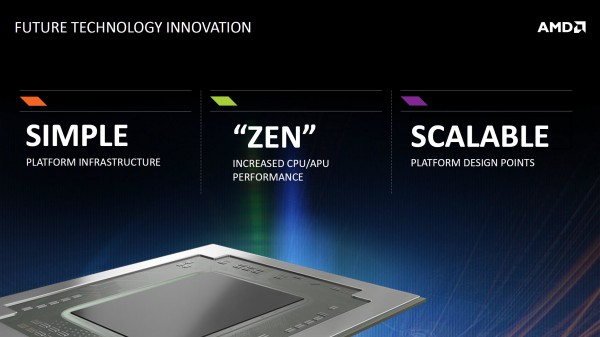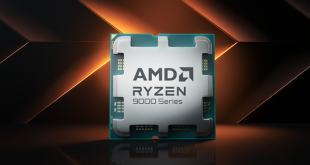While many of us have been expecting AMD's new Zen architecture CPUs to launch during the second half of this year, with some rumours pointing towards an October launch, a new report this week citing industry sources claims that due to “serious inventory issues” we may not see Zen until CES in January 2017, alongside a new Intel launch.
The initial report comes from DigiTimes, which claims that Intel's Kaby Lake and AMD's Zen launches have been pushed back to early 2017. On the Intel side, the delay is apparently due to related brand vendors still having too much Haswell and Skylake stock to clear.
On the AMD side, the report says that Zen is produced by Globalfoundries on the 14nm process but goes on to say that a delay is expected to be announced.
DigiTimes can be a bit hit and miss with its information and while a few more details were provided for the supposed Kaby Lake delay, barely any information was shared on the Zen delay beyond saying ‘it's happening', so take it all with a healthy dose of scepticism, particularly given the anonymous nature of the sources cited.
Discuss on our Facebook page, HERE.
KitGuru Says: The initial report didn't supply a ton of information to back up its claims, particularly when it comes to Zen so I would remain sceptical for now. If this is true, then we will probably hear some more information come out in the coming weeks or months.
 KitGuru KitGuru.net – Tech News | Hardware News | Hardware Reviews | IOS | Mobile | Gaming | Graphics Cards
KitGuru KitGuru.net – Tech News | Hardware News | Hardware Reviews | IOS | Mobile | Gaming | Graphics Cards




for the last time, there are so many reasons why this makes no sense for AMD I don’t even want to get into it. There are legitimate reasons for Intel to delay like problems with Optane and that it doesn’t offer that much of an improvement over Skylake, or maybe Intel is working on a new socket and chipset that is backwards compatible with Broadwell and Skylake but isn’t compatible with older offerings thus forcing more upgrades for people. Or maybe Intel is working with Microsoft because they are having issues with Windows 10 compatibility
If Zen gets delayed to 2017 or not released before November i will buy Intel. I don’t think AMD would want to miss this entire year and come out with nothing for the holidays.
Yep, let’s go with GloFo delays.
😉
The delays were due to them having trouble getting their own processes ready. That is irrelevant this time as they are using Samsung’s, which is known to be ready.
I think that what has happened is that either the leaker or the website misunderstood some information. AMD has been saying for a while now that they will role out Zen starting with HEDT and then servers, mainstream desktop and laptops will follow (though they did not say what order the last 3 will come in). No doubt the CES release will be for one of the last three. AMD has already almost blatantly said that all 3 will be early next year. But the HEDT parts will almost certainly be this year still given it was less than a week ago that Lisa Su re-iterated that at Computex.
During Computex conference it was said that Zen is on schedule and that meets expectations. AMD will start rollout this year and finish it during Q1 next. Also, there is no reason for Intel to delay their CPUs. There is no proof for either of the companies.
Raven Ridge is due q1 2017, I guess it is possible that 4 core versions of Summit Ridge will also be out then too under the Athlon nameplate
FUD spread by obvious suspects. Just at Computex it was reiterated Zen based HEDT parts are on schedule to launch this year.
Shhhh.
Let Intel think there are delays.
😉
LOL, sorry. My bad. 😛
I never thought of the core core versions being Athlon as the Athlons in the last few years were just the APU with the GPU stripped out or disabled (not sure which). It would be interesting if they changed it like that since it’d be giving the modern Athlon brand a more powerful core than has been traditionally the case.
that pretty much is my exact thinking with the Zen version of an Athlon as Raven Ridge is Zen with a beastly iGPU and either disabling or skipping out on the iGPU for it, either way, it will be incredibly strong core for core and unlike current gen Athlon offering, this will have an L3 cache so it will be able to be as strong per clock as a full 8 core
So, the title says both AMD an Intel are being delayed, yet the article brings up AMD more (why?) and therefore we see some defensive responses for AMD. What about Intel? Technically, we don’t need a Skylake refresh, but I suppose the new name helps the computer illiterate majority buy stuff. Sucks AMD is being made late, just adds to the fodder for anti folks, but while Intel being late isn’t a big deal, I just find it odd with all their revenue they can’t throw enough money at the problem to keep it from changing the schedule.
Honestly I have no idea what you are getting at. The story isn’t worded to be defensive of AMD, it is worded to be critical of the source of the information.
I didn’t say the article was worded in defense, rather I noted a ‘why’ in parenthesis towards bringing up the impact of AMD’s delay more than Intel’s delay within the article despite the balanced title. About the only responses in the comments towards or against the delay were with regards to AMD, I can count 9 so far. No one is upset or critical of Intel, which while I understand a refresh isn’t needed, but that doesn’t mean we should apologize for it.
Are you sure there will be an L3 cache? Traditionally they have not done that in their low end CPUs. I hope you are right though as that will help it to better compete with Intel since all Core based CPUs have L3, even Celeron and Pentium.
I assume it will not just be Athlons though if true. I assume Zen based APUs will as well. If so things will definitely get much more competitive at the low to mid-end where the vast majority of sales occur.
I’m almost certain based from what is known about Zen, the new Athlons should have an L3 cache as the L3 is part of each Zen module (as opposed to with the Bulldozer family) so the new APU’s will have one too
Thats my thoughts. Running a 1090t and I am ready for an upgrade, lets be honest, AMD has not had anything worth upgrading to since.
Bulldozer, piledriver and Excavator were also designed with L3 cache, but the Athlons and APUs lacked L3 cache. So I don’t think Zen having L3 cache means Athlons and APUs will have it. As for being part of the module, that is an assumption that people are making based on what is assumed to be a die shot of Zen, so it is far from proof. It is at best a suggestion.
to my knowledge, there are no versions of Steamroller and Excavator with an L3 cache, if there is, please let me know. I’m basing my hypothosis on the Zen APU’s and by extension Zen Athlons having one from the leaked die shot of Summit Ridge showing each Zen module having its own L3 that was built in, Zambezi and Vishera had it but it wasn’t part of the modules so it was unlikely APU’s would have an L3 because of the space for the iGPU, although the Athlon 845 should have had one as it has no parent chip with an iGPU so it should have had an L3, pardon my grumbling
I said designed. As in the R&D stages not what was released. Remember, Steamroller and Excavator was originally designed for the FX line not APUs. However, they ended up cancelling the FX CPUs with them that would have had L3 in order to both cut R&D costs so their losses would be lower, while also shifting more of the remaining R&D budget to Zen in order to ensure it would come out as good as it possibly could.
Anyway, I really hope you are right about the APUs and Athlons. It would be a nice way to make them much better than they are now. I had to go with an APU due to budget concerns, but I am not very happy with it.
I actually did not know that about Steamroller and Excavator, I knew it was planned there was going to be heavily multithreaded versions of both in the server end that got cancelled but I did not know about a consumer version. Would have been cool to see what both could have done, I also have to wonder if Zen having 40% higher IPC than Excavator was based off Ex having an L3 cache too.
I hope I am right, I have serious doubts they would cut out the L3, either way with Raven Ridge, it is going to be awesome, present mid range graphics in an APU